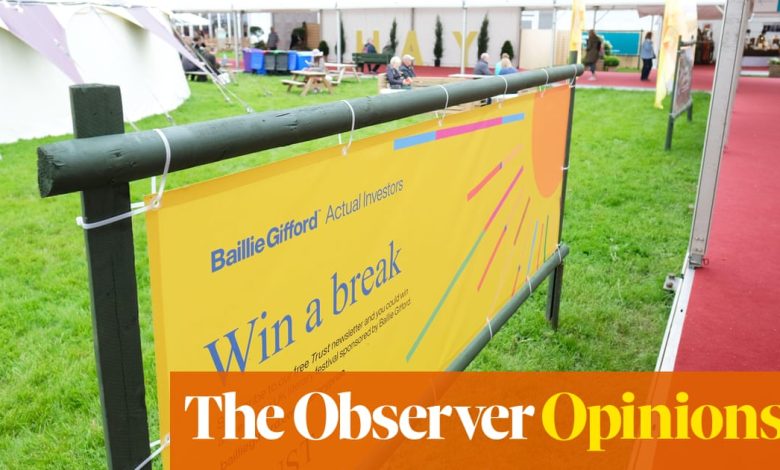Filthy lucre is everywhere, but book festivals are an easy target for protesters’ fury | Martha Gill

[ad_1]
hhow nice it is to throw dirty money back in the face of a future benefactor. Such moments mark literature. Pip refuses funds from Magwitch, a prisoner. Will Ladislaw scorns the charity of George Eliot’s depraved Bulstrode. The claim is this: scruples do not belong only to the rich. There is a price at which I cannot be bought either.
Anyway. In these great works of fiction, tension is drawn out, questions are raised. Ladislaw accepts support from another wrongdoer, Casaubon, of whom he disapproves. Hypocrisy? Or the observation that in a hard world pragmatism has its place – that beggars can only choose on occasion? And is Pip right to reject the reformed and grateful Magwitch? Are all avenues to redemption thus to be closed?
Philanthropy is a curious business. What ultimately compels people to give their money? High-minded principles, yes, but also guilt, vanity, knighthoods, dinner invitations, the need to maintain a battered reputation, the desire to burnish a brand. The hope, too, that after you’ve floundered in an imperfect world and reached the top, you can finally begin to shape it for the better. Good things come out of this mess of human frailty. Throw back too much tainted money and eventually all charities will go bankrupt.
For a certain type of purist, however, that’s not good enough. To them, every coin is dirty, forged in the despicable furnace of capitalism. Do they dream of a world where only true do-gooders give to charity: environmental activists, perhaps, or writers of uplifting novels? Difficult, because this is precisely the kind of work that requires philanthropy in the first place. Which brings us to this week’s news: under pressure from activists, both Hey and on Edinburgh International Book Festival fired their main sponsor, investment fund Baillie Gifford, blowing a huge hole in their finances. Why? The anti-capitalist group Free books on fossils launched a campaign against him, claiming that he is destroying the planet by investing in fossil fuels and is also linked to companies that “profit from Israeli apartheid, occupation and genocide”. More than 200 authors have signed an open letter threatening to disrupt and withdraw from the events unless Bailey Gifford gets rid of these appearances.
“We were trying to put pressure on the asset manager to release, not the festival itself,” campaigner Grace Blakely said to Telegraph after Hay’s statement. But that was never going to happen. As stated in Baillie Gifford’s statement, he manages other people’s money. It is not allowed to make ethical decisions on their behalf. As for “ties” to the war in the Middle East, the letter talks about investments in companies such as Nvidia, Amazon and Alphabet. If Bailey Gifford is complicit in this, so is pretty much everyone else.
In any case, the company seems an odd focal point for the fight against climate change. Just 2% of its clients’ money is invested in companies that have businesses linked to fossil fuels – which could include Tesco, for example – against a market average of 11%. Meanwhile, a quarter goes to cleaner energy. It is invested in the beginning Tesla. That’s because it specializes in long-term investments, a spokesperson told me. Fossil fuels aren’t a good bet, but clean energy is.
And with Bailey Gifford gone, will these two festivals be fossil-free? Not while people are driving there, using their smartphones, eating things wrapped in plastic and, yes, buying books. Ink is made from petrochemicals; the conversion of wood into paper represents a major part of industrial emissions. Books are a carbon-intensive product. I don’t mean to bash environmental activism; if the tide is turning, it is thanks to the persistence of these groups. But why Bailey Gifford? Second question: why target him only through his good works in the book world? Many investment managers – as well as oil companies and arms sellers – do not try to pay the channel and are left alone. Meanwhile, philanthropists are heating up.
Third. Why book festivals? Like writer Sam Leet pointed out last week, they’re not exactly at the center of the world’s oil money. What could be the point?
I think there is an answer to all three questions. It is a quirk of human nature to direct our anger not at the worst sinners, but at the sinners who will be most opposed—and therefore most easily broken.
Blaming a huge and unrelenting oil company gets tiresome after a while. How much more satisfying is it to boycott a book festival, an event already bristling with sensitivities—the need to encourage balanced debate, to appease other sponsors, to avoid disruptions, to prevent a few panelists from walking out? This is a mature goal. So do authors: surely anyone promoting a book’s worst nightmare is to find themselves on the wrong side of a moral culture war. Apply a little pressure here and a little there and you might just see results.
after the promotion of the newsletter
is not accidental, and that we tend to choose our pariahs from among those who try to do good and slip up, rather than outright villains. First, they are much more likely to care. Second, a deadly charge can be brought against them: hypocrisy. They supposedly have morals, but they don’t. Therefore, the punishment falls on the associates of the associates and not on the evil itself.
The world can only devote so much attention to climate change. By hitting easy targets, activists let much bigger wrongdoers off the hook. And what an irony if now only the purest among us can give money in a world notorious for cash shortages. Those who study the moral complexities of literature learn that they have no place in real life.
[ad_2]




